Across the courtyards, past the 7 massive gates
Are some elegant palaces with their dazzling illuminates.
Spot these ancient treasures & imagine the erstwhile court
As you walk along inside Mehrangarh Fort.
A complete guide to the history, architecture & interiors of one of the best Jodhpur forts. Take a virtual tour of the Mehrangarh fort Jodhpur and get tips to plan your actual visit here.
There is enough said and written about Mehrangarh Fort in Jodhpur. It is recognized as one of the best-maintained forts in India. I totally concur with this. Among all the forts I have seen, this was one of the most stunning forts and is my current favorite. I spent half a day inside Mehrangarh Fort and still feel like visiting this Jodhpur Kila again. The fort is an absolute delight for photographers and a treasure trove for heritage buffs.

Throughout my tour of Jodhpur Mehrangarh fort, I felt so overwhelmed and frenzied. There was just so much to capture and absorb. From the mesmerizing Mehrangarh fort history to its incredible architecture and interiors, you will find yourself completely engrossed and maybe, even lost. This Mehrangarh fort guide is all about making your journey through this Jodhpur fort easier.
In this blog article, I will be sharing all the things to see inside Mehrangarh fort Jodhpur. I have also, covered useful tips like how to get here, the best time to visit, the Mehrangarh museum and entry fees and more. So get ready for a whirlwind tour of this Jodhpur attraction.
Quick links to Mehrangarh Fort and Jodhpur
In case you are looking for some quick links to tours, places to stay and travel accessories for your Jodhpur trip, you can consider using these online options.
- Booking.com has several Jodhpur hotels listed on their site. You could use this link to browse and book the same.
- Viator.com offers several tours in and around Jodhpur. Here are some top rated ones that you should consider booking for your Mehrangarh and Jodhpur visit.
- GetYourGuide has various local tours and car bookings available that you can use to explore Jodhpur. They are also, well reputed and you can consider these highly-rated tours of Jodhpur
- For any of your travel needs or general shopping, consider using Amazon through this link.
Disclaimer: This article includes affiliate links. This means that at no cost to you, I will receive a small commission if you purchase through my link. Thank you for supporting me with this.
Contents
- 1 History of Mehrangarh fort Jodhpur
- 2 The Mehrangarh fort architecture and layout
- 3 Things to see inside Mehrangarh Fort Rajasthan
- 4 FAQs about Mehrangarh Fort in Jodhpur, Rajasthan
- 5 What is the best way to reach Mehrangarh Fort?
- 6 What is the best time to visit Mehrangarh Fort?
- 7 What are the Mehrangarh fort timings?
- 8 How much do the Mehrangarh Fort tickets cost?
- 9 What are the Mehrangarh Fort guide charges?
- 10 How much time does it take to visit Mehrangarh Fort?
- 11 Who is the current owner of Mehrangarh fort?
- 12 Do you have to walk up the Mehrangarh fort or you can drive up?
- 13 How did Mehrangarh fort get its name?
- 14 What is the famous quote of Rudyard Kipling on Mehrangarh Fort?
- 15 Travel and Photography tips
History of Mehrangarh fort Jodhpur
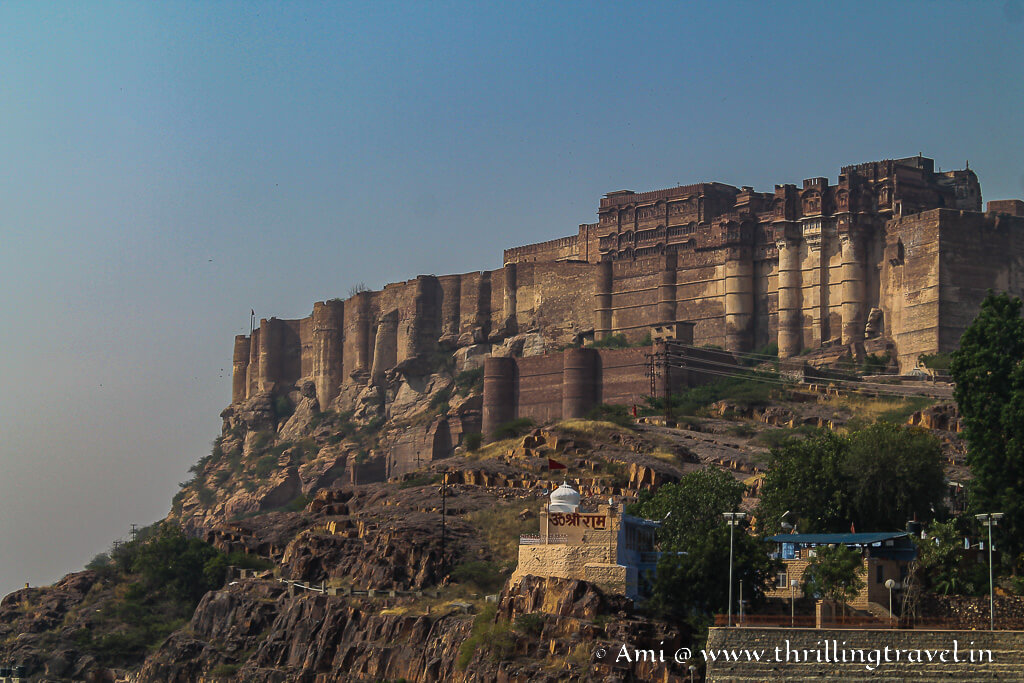
Located on a hillock, this huge fort looks over the blue city of Jodhpur. For over 500 years, it functioned as the capital of Marwar. However, this wasn’t always the case. The initial capital of Marwar was Mandore. For over a century, the Rathore clan ruled from there. However, the place had already witnessed quite offered better protection. Once this “citadel of Sun” (Mehrangarh) was built, Mandore was left abandoned.

Though abandoned, Mandore is not completely lost. In fact, you can still visit it when you are in Jodhpur. Check out my complete guide on Mandore
History has it that when Maharaja Rao Jodha decided to build a fort on this hillock – Bhaurcheeria (mountain of birds), he upset a hermit staying here. The hermit known as Cheeria Nathji (Lord of birds) was angry that he was losing his home and initially refused to move out. Finally, the Maharaja sought help from the powerful warrior God – Karni Mataji. It was only upon her request that the hermit finally moved out – but not before cursing the King. He told Rao Jodha that his land would always suffer from a drought. The Maharaja managed to calm the saint down by getting him a house and a temple near the same cave that he used. However, since the curse could not be revoked, a human sacrifice was used to alter the effects of the curse.
This is where Raja Ram Meghwal, a resident of Jodhpur willing offered his life in exchange for a favor that his wife and sons would be taken care of by the King for eternity. He was buried alive and the king build the epic Mehrangarh fort. Pretty gruesome, if you ask me – but well, it is the dark secret of this fort.
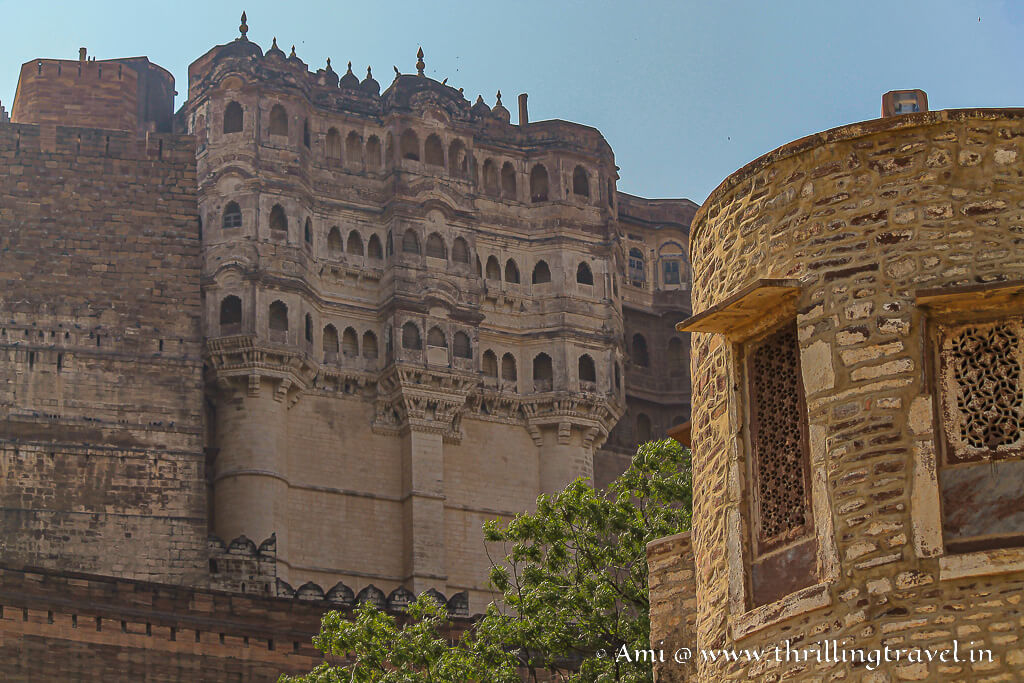
The first year of construction of Mehrangarh fort is recorded as 1459. However, the subsequent Maharajas kept expanding the fort for over 500 years. The fort did face a few wars – including one called the siege of Mehrangarh in 1807 during which the Jaipur army surrounded this Jodhpur fort for almost 6 months. However, this Jodhpur fort remained strong and did not face any major destruction. Today, it is still owned by them and it is the trust established by the current owner – Maharaja Gaj Singh II that runs the Mehrangarh fort museum and maintains it.
The Mehrangarh fort architecture and layout

With a history of over 500 years of construction, it is not surprising that Mehrangarh fort architecture is a potpourri of styles. As you walk inside Mehrangarh fort Rajasthan, in some places you will spot Rajputana style as well as Mughal architecture. In fact, some of the Mehrangarh palaces like the Phool Mahal resemble Shahjahan’s abode. There are several other variations that you will see as you enjoy the Mehrangarh fort interiors.
However, there is no clear demarcation of these styles of architecture of Mehrangarh Fort. Nor is there a progression from the old to new structures. You will, in fact, find some of the older structures too, with some new architectural decor. These are the changes made by the different Maharajas during their rule.

The Jodhpur Mehrangarh fort is spread over 5 km and has walls that are 120 feet high & 70 feet wide. Along with the hill, this fort is almost 400 feet high over the blue city. There are seven gates that lead to numerous courtyards and palaces within the fort premises. You will also, find living temples within the Mehrangarh fort, some of which are still revered by the locals. Most of the palace has been made using red sandstone but here and there, you will find an elaborate use of marble.


As you begin exploring inside Mehrangarh fort, you will find yourself falling in love with the artistic sandstone doors and windows. For those on the outside, the jhalis or the lattice screens appear as floral walls but for the women, they offered a clear view of the proceedings in the courtyard. The eaves over the windows and roofs are multi-layered -each with its own set of carvings. The overall effect left me completely stunned.
It is time, we embark through those mighty gates and see the Mehrangarh fort interiors for ourselves.
Things to see inside Mehrangarh Fort Rajasthan

The sheer size of the Mehrangarh fort should have you prepared for an upcoming frenzy. However, I have you covered with this guide to the main attractions of Mehrangarh fort. Make sure you have bookmarked this post so that you can open it when you get there and have it handy. You can always go back and forth between the sections through the table of contents to ensure you have your checklist covered.
The seven Mehrangarh fort gates
Seven massive gates and each one is associated with a legend of its own. Many of them were added to celebrate victory and then there were some that just added extra protection. The only way in is to pass all seven gates and that too, by foot. Yes, you will have to prepare yourself for a long walk – with some parts that go uphill. There is no other way to get inside Mehrangarh fort.
Entrance to Mehrangarh Fort – Jai Pol

The entrance to the fort is very impressive. I think we spent, around 5 minutes, trying to just grab pictures near the entrance. We had to literally prod each other to move on. The entrance itself had some interesting sights. – starting with this Chhatri of Kirat Singh Sodha.

This was a memorial for a brave soldier called Kirat Singh Sodha, who lost his life while defending this Jodhpur kila against the Jaipur army during the siege of Mehrangarh. Just above that was this unusual small hook and pulley system high up on the walls. There was no explanation given for this but my guess is that it was possibly a way to lower things and get things into the fort – given its height.


And finally, the creamy gorgeous gate with its artistic carvings. This gate was an addition to the original fort by Maharaja Man Singh and is called the Victory Gate or the Jai Pol. It was done to commemorate his victory over the Jaipur army. Don’t miss the lovely paintings from Hindu history and mythology near the gate. These are paintings are examples of miniature art belonging to the Marwar school of art.
Fateh Pol – Victory gate
This one is a little smaller and was made to commemorate the victory of the Rathores over the Mughals in 1707. This was made by Maharaja Ajit Singh. While passing through this gate, you get a lovely view of the towering palace of Mehrangarh – the white exteriors contrasting the reddish-brown walls.
Gopal Pol gate
You can identify this gate with its huge spiked doors that could stop a rampaging elephant. The gate seemed to be made as a security measure.
Dedh Kangra Pol of Mehrangarh kila

The significance of the Dedh Kangra gate lies in its walls. You will see circular depressions on the wall that were made by the cannon balls from an enemy attack. I was told that these were attacks from Jaipur. Our guide told us that despite these attacks, the fort did not fall into the hands of the enemy and stood strong.


Another significant thing here was this memorial – an ode to the human sacrifice made when building this fort. This is where you will see a small sign indicating the place where Raja Ram Meghwal was buried alive.
The wall opposite this place was the original place where the Mehrangarh Fort ended. So far, all that we had seen, were extensions of the original palace – all done by the generations that followed Maharaja Rao Jodha. Here is where you discover another color to the mix of what I had already noted the fort for – white, brown and now red.
Maruti Pol
This is just an arched entrance between the two most important gates of Mehrangarh fort (Dedh Kangra and Loha pol)
Loha Pol – one of the most important gates of Mehrangarh fort

The climb to the next gate is a steep one and a colorful one. You will pass by tons of musicians, puppeteers and dancers along the way till you reach a huge iron gate – aptly named Loha Pol. Loha means iron and the gate with its sharp spikes totally justifies this name. This gate is a sharp turn, intended to slow the army further. It is here you will unravel another dark tale of this fort.
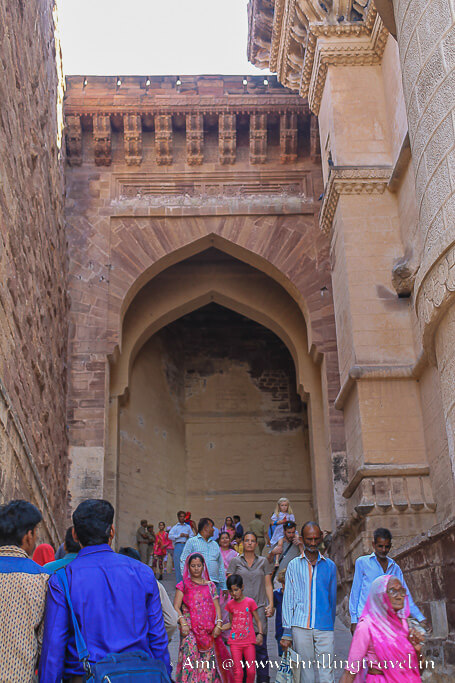

By the side of this gate, you will see 16 handprints. These are not ordinary hand prints but the last memories of women who left the Mehrangarh fort to commit Sati. One wall has that of the concubines while the wall opposite it has 5 hand prints of the Queens of Maharaja Ajit Singh.
Suraj Pol
Suraj Pol is the innermost gate of this mighty Jodhpur Kila. Cross this and you will be standing in one of the main courtyards of Mehrangarh fort – the Shringar Chowk.
Shringar Chowk inside Mehrangarh Fort

Once you have passed through the Loha gate, you will fully appreciate the contrasting play gorgeous colors of Mehrangarh Fort. Red against whites, with the intricate work on the exteriors – mesmerizing indeed. A short climb up and you come to a center courtyard called the Shringar Chowk. This is where you see a white marble throne – one that was used for shringar of the new King. Essentially, the coronation ceremony.


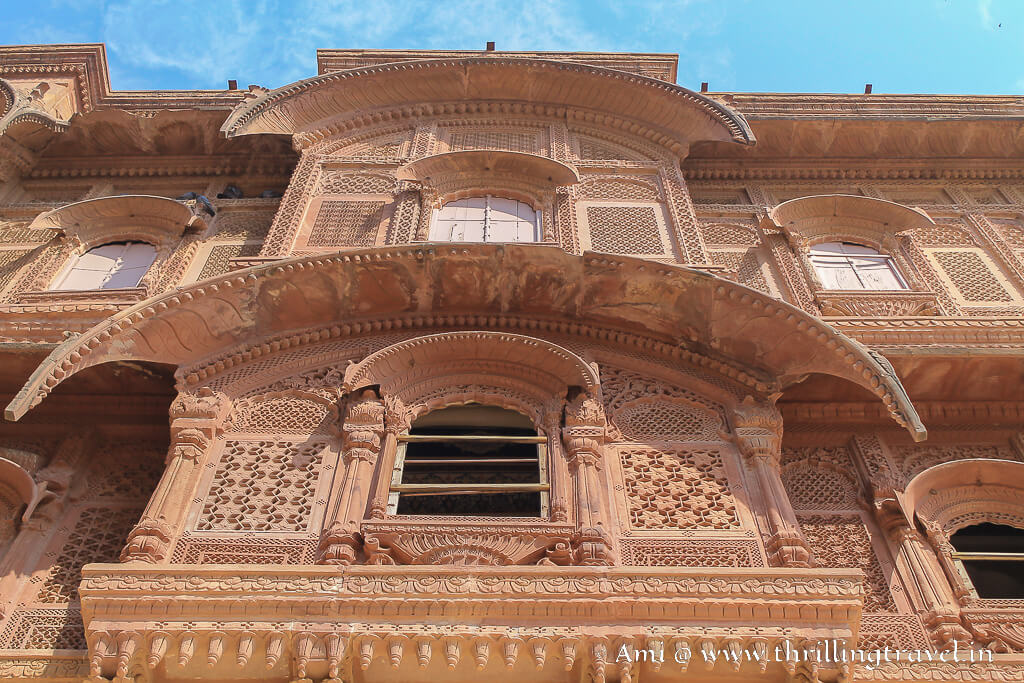
This white throne sits against the backdrop of delicately carved windows. An effect that is unique and trademarked to Mehrangarh Fort. Various stunning doorways beckoned me and I was actually lost and confused as to where to continue my journey. Soon enough, I discovered that one of those doorways leads to a cafe, two are out of bounds for visitors and the remaining one is the start of your journey through the Mehrangarh fort museum.
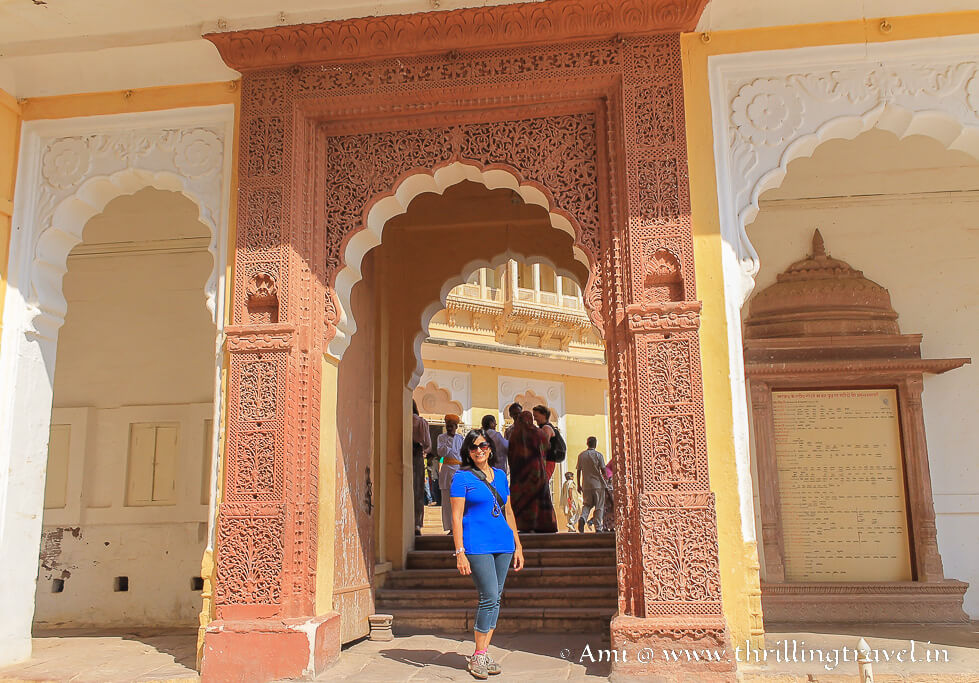
The galleries of Mehrangarh Fort Museum
Mehrangarh fort museum has been created in what was the original durbar hall of Mehrangarh fort. Today it has well-curated galleries that take you back to the glory days of this fort. The galleries are interspersed with magnificent palaces or period rooms. Hence, you are unlikely to experience it in the same sequence that I have mentioned in this Mehrangarh fort guide. Wherever possible, I have indicated its exact location in the Mehrangarh fort.
Palanquins & Howdahs Gallery

I have often seen pictures of palanquins and howdahs used by the royalty but never really paid attention to how ornate or unusual they can be. The exhibits at the museum made me realize how short-sighted I was. In those days, even the most mundane of things were so artistic, never mind the howdahs and palanquins. Here are some of the unique howdahs used by the Kings.
P.S : One of which has been presented by Emperor Shahjahan of the Taj Mahal fame to Maharaja Jaswant Singh.
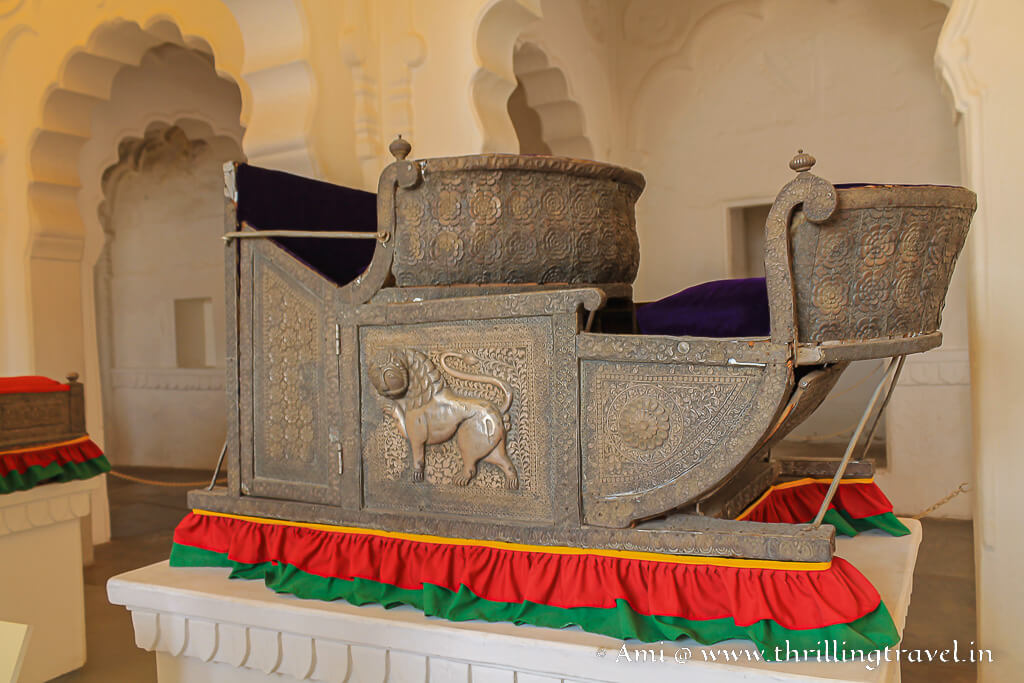
It was not just the mount on the elephant that was artistic. The royal elephant itself, was decked in unique gear. You will find these pinned up on the walls.
The women folk were generally moved around in palanquins, which could be covered with a cloth so that the lady was not seen by the public. Of course, this is not to say that the men did not use palanquins. They did too. And the choice they had! Don’t miss the glass and lacquer one that is on display in this Mehrangarh fort gallery. There is also a European one with a glass-eyed peacock that also, has a sharp beak to provide added protection to the royalty


My personal favorite here was an ornate palanquin made of gold and glass. It reminded me of the golden howdah that I had seen in the Mysore Palace. Of course, this one was much larger.

Check out this golden howdah that is displayed at the Mysore Palace in India. This one is made of 84 kgs of gold and the best part – it is still used. Read more about it
The Hookah Bar at Mehrangarh Fort Jodhpur
When I heard the story of Sati at Mehrangarh fort, one thought that I constantly kept having was – how did these women even have the courage to throw themselves in a live fire? The answer to some extent was given by this hookah system.
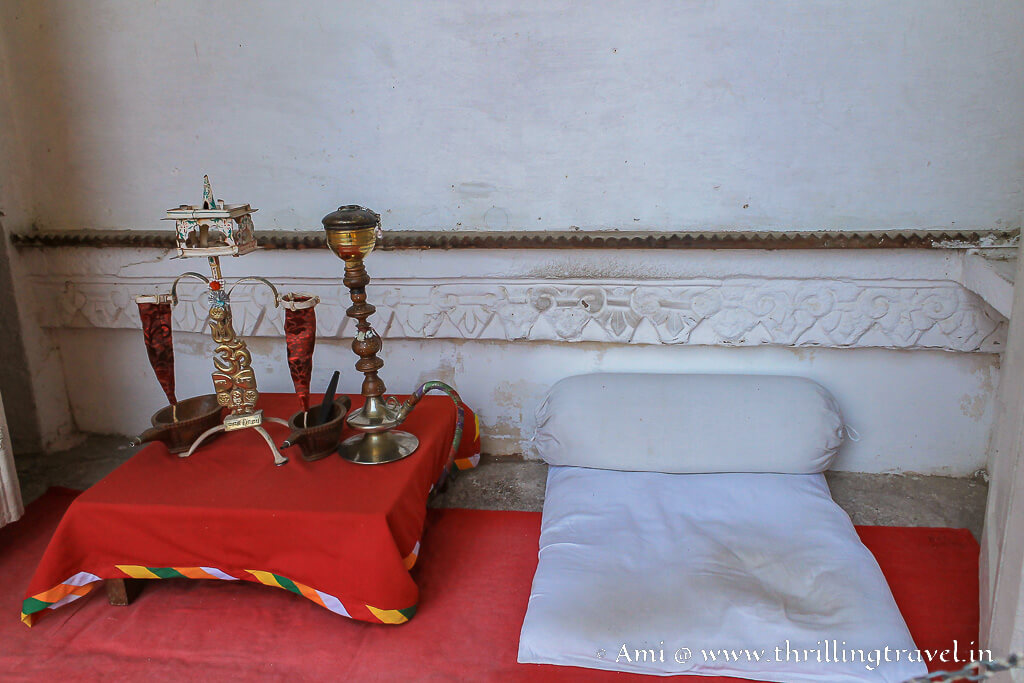
Opium smoking was considered to be fashionable by the royalty and there were elaborate parties and ceremonies for the same. Especially for women who were going to be Sati. The opium made them lose fear and made the entire ordeal a lot easier. Funny – how one vice was used to ease a dark ritual.
Daulat Khana

Daulat Khana, which literally translates into “treasure room“. A befitting name for the treasures it houses. Capturing all these treasures into a single post is impossible and hence, I am leaving you with the highlights. Palanquins, howdahs and hookahs, I have already shared. Take a look at the elaborate war tent that were used back then.

Aside from this, a collection of really “artistic” weapons are on display. The hilts of the swords and the guns were just so amazing that was hard to believe they were even used in warfare. Take this shield as an example. If someone were to thrust this on my face, I would have stopped attacking. Who would want to damage such a piece of art?

And of course, some girlie things that appealed to the feminine side of me. My favorite – is this jewelry case. I loved the cute little key that it had. It reminded me of all those fairy tales. Don’t you think it is adorable?
Sileh Khana or the arms gallery
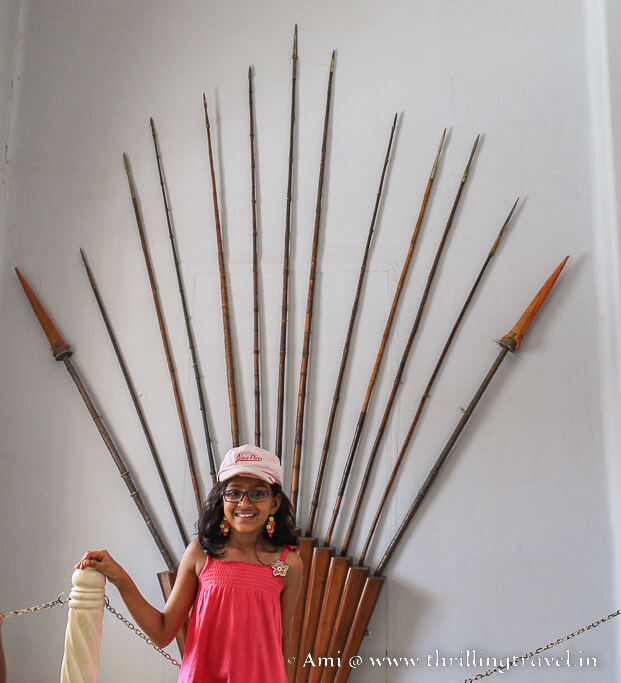
You will encounter this gallery after a few palaces- specifically after the Jhanki Mahal. This armoury section displays all the weapons used by the Marwar army. You will find spears to arrows and guns on display in this section.
Painting gallery

The painting gallery of Mehrangarh museum honors the glorious heritage art of miniature paintings. These miniature paintings belong to the Marwar school of art which was patronized by the Rathores. The displays of this gallery keep changing with the theme that stays on for 2 years. If you want to know the current theme on display, check the latest information on this website.
Textiles gallery of Mehrangarh Museum
This gallery is somewhere between the Phool Mahal and Sheesh Mahal palaces of Mehrangarh fort. It exhibits the ornate fabrics used as furnishings to decorate the Mehrangarh fort interiors. You will find plush Persian carpets, silk & velvet brocades, tent hangings along with the royal outfits worn by the erstwhile residents of the fort. There is an amazing display of turbans that were used by the royalty in this section.
Mehrangarh fort palaces | Period rooms
When you have over 500 years of inhabitation, you can expect a lot of variety in the residential quarters. The palaces or the period rooms of this Jodhpur fort showcase grandeur in so many different ways. I can classify these palaces into three categories of period rooms –
- The Mardana or the King’s private chambers
- The Zenana or the ladies’ area
- The public audience halls
Personally, if you ask me, the tour of these palaces in Mehrangarh Kila was my favorite part of the entire visit. And you will soon see why!
Sheesh Mahal Jodhpur

The Sheesh Mahal was the bed chamber of Maharaja Ajit Singh (the same Maharaja for whom so many women become Satis). The elaborate glass and mirror work is what gave it the name “Glass palace” or the Sheesh Mahal. You can only see this chamber through a small enclosure. The same is perpetually crowded and owing to the rush, we could not really spend too much time here. However, those few minutes that we managed, were enough for us to realize how stunning this chamber was – with its colorful floral motifs interspersed by the mirror work and colorful paintings from Indian mythology.

The original mirror roof is what you see on the floor in the center of this room. Since the same had collapsed, a new one was built by the museum authorities. The original mirror work was so amazing that one candle lit here was enough to light up the entire chamber.

Sheesh Mahal is quite a common feature in the Rajasthani and Mughal palaces. This one is the mirror palace of the famous Amer fort in Jaipur. Quite different from the one that you see in Jodhpur and yet similar.
Phool Mahal of Mehrangarh fort in Rajasthan

Like the Sheesh Mahal, the Phool Mahal is also a part of the Mardana area. Phool Mahal translates to the Palace of flowers. This was built in the 18th century. A collective silence is what we got as soon as we entered this room and you can see why.
All kinds of colors filled up the room – from the ornate gold to the vibrant reds and blues. Built by Maharaja Abhay Singh, this room was used only by the men of the Royal family for their private celebrations – birthdays, ceremonies or even strategic and private meetings. If you notice the paintings on the walls here – they are of the members of the royal family. Everything about this room was just royal – from the gilded ceiling to the elaborately carpeted floors and stained glass windows.
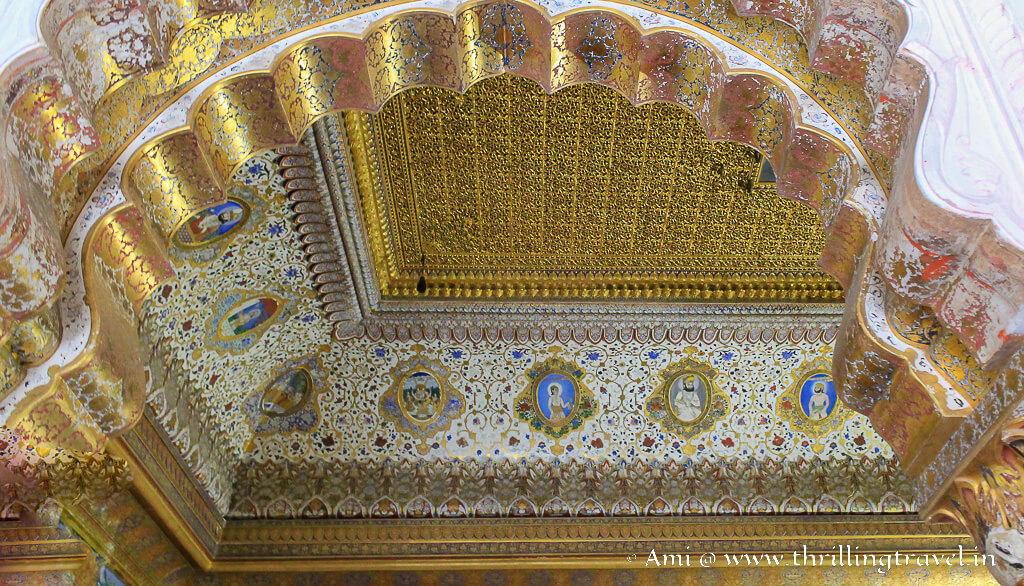
I personally, felt a little too overwhelmed by the glitz of this room. I am surprised that it was not named “Sonar Mahal” or the Golden palace. It was a little too ostentatious for my tastes, but then, who am I to complain? After so much bling, I really need to rest my eyes. Escaping into a small balcony, I found this pretty spiral staircase that gave my eyes a much-needed relief. Almost akin to smelling coffee beans after testing several fragrances.

Takhat Niwas
For a moment, I was wondering if they celebrated X’mas here. What with the X’mas balls hanging from the ceiling, till I was explained that these were the chambers of Maharaja Takhat Singh and he was a great patron of arts. If you note the interiors are filled with paintings from Hindu mythology. The X’mas balls? They were just a gift from the British and hence, were hung around.
One more funny thing that you can note here. Check the length of the bed. Wondering if the Maharaja was a dwarf?

No! No such thing. He was a regular-sized man but the bed was deliberately made small so that his legs would touch the ground and if he was under attack, could react fast. Argh! Talk of Power and loss of sleep!

From here, you can just walk on the outer corridor and get some stunning views of the Blue City and of course, people enjoying their zip lines- which one of the most popular adventure activities offers in Mehrangarh fort. The activity is run by a company called Flying Fox and there are a total of 5 different lines that take you over the heritage fort walls.
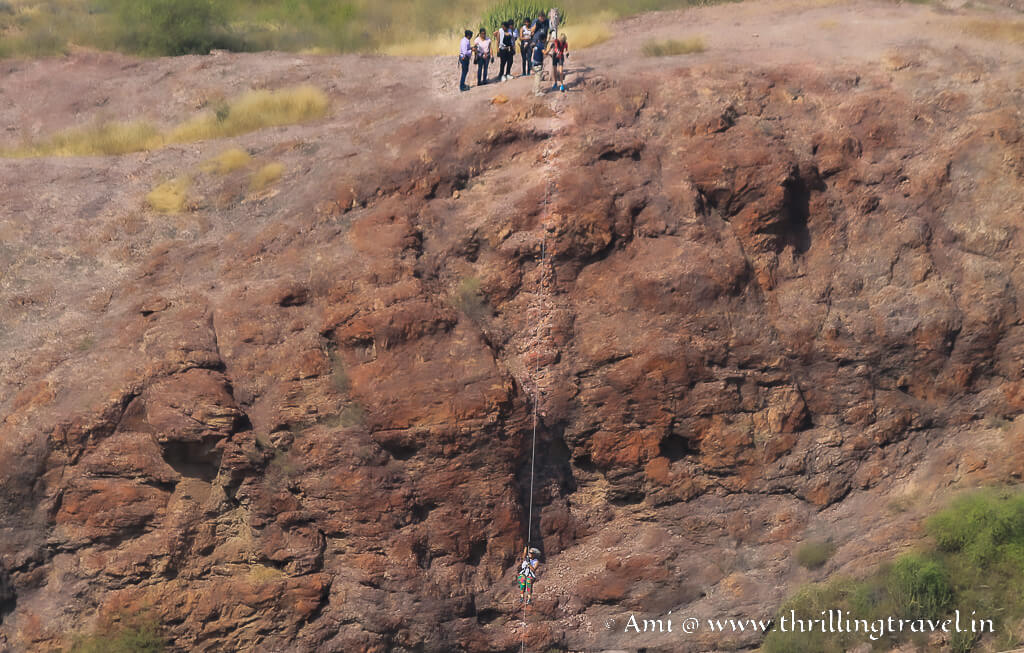
Jhanki Mahal – the beginning of the women’s chambers
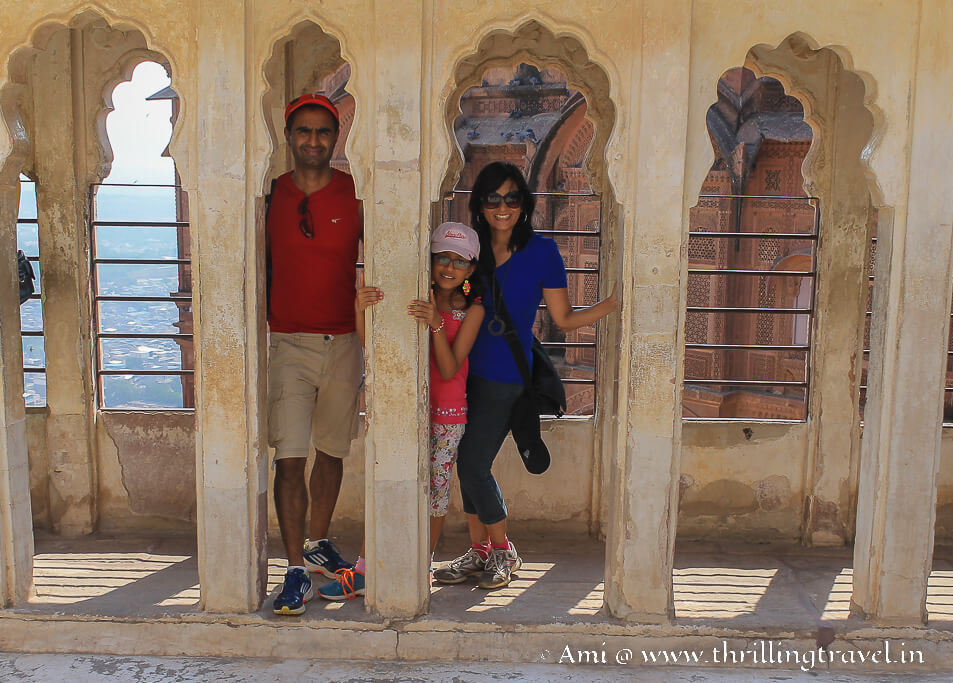
Jhanki Mahal translates to the Palace of Glimpses. To get to this chamber you pass through a small courtyard or terrace. This corridor with lattice work walls was a section for the women to observe the royal proceedings in the Shringar courtyard. Remember – women were not allowed in public.
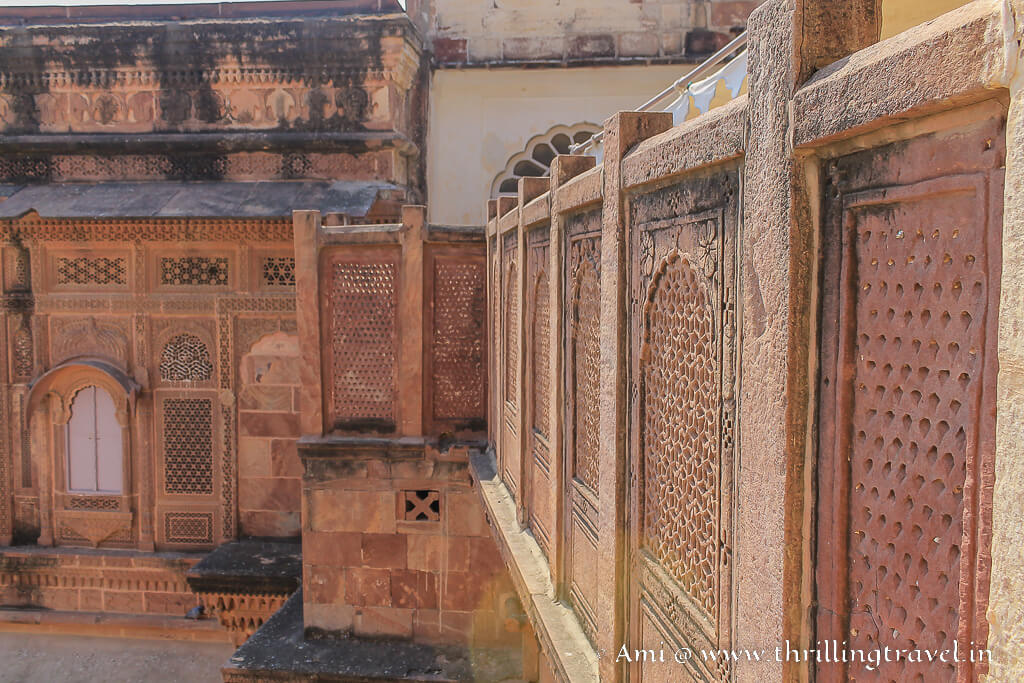
Even the Queen mother could not attend her son’s coronation ceremony and could only watch it behind these screens. I took a peep from these screens and realized that it was literally a “keyhole view” of what was happening below. I thought of how I make it a point to be there for all my daughter’s events and how it was important for me to have a full view of all that she was doing, Given that, it made me feel sad for these royal ladies for they could never be fully involved at the palace. Their life was just behind these screens. Not exactly what I would bargain for. Maybe I would have been a rebel in those times.



The Jhanki Mahal has rooms that were used by the Royal ladies to peep down at the royal proceedings in the courtyard. Currently, it has been converted into a gallery where the cradles of the royal children are displayed. Gosh! Even these were so unusual and artistic.
Moti Mahal of Mehrangarh Fort

Moti means Pearl and this room was a perfect metaphor for this. One look at it and you know why I fell in love with it.
Moti Mahal was the “Hall of Public Audience” or the Diwan-e-Aam section of Mehrangarh Fort. It is supposed to be one of the oldest parts of this fort and was built by Sawai Raja Sur Singh. Compared to all the rooms that I had seen so far, this one was more to my taste.
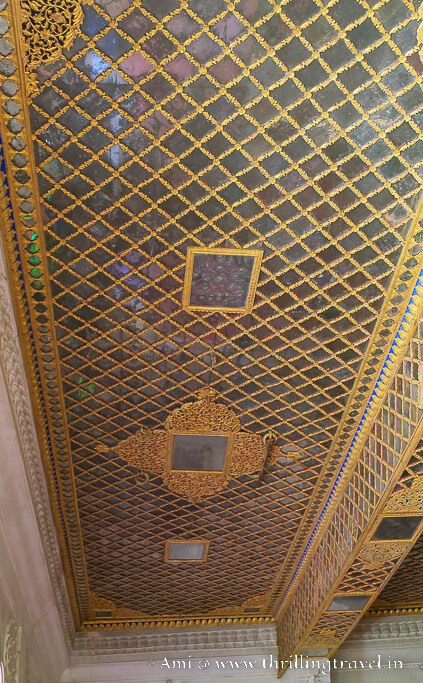
The simple white finish of the lime plaster on the walls is awash with vibrant colors – thanks to the gorgeous stained glass windows and the stunning glass and mirrorwork ceilings. A little minimalist with a touch of extravagance.
Dipak Mahal
More than a palace, this is an administrative area where the Diwans and the other staff of the Maharaja sat and conducted their business. It was built initially in the 18th century by Maharaja Ajit Singh and later renovated by Maharaja Takhat Singh. There is a royal seat for the Maharaja in the chambers – in case he came by to conduct business.
Sardar Villas
The Sardar Villas was closed when I visited Mehrangarh fort. However, I am given to understand it is now a gallery of doors and windows that were used in the fort. You will find this somewhere in the Mardana area between Phool Mahal and Takhat Vilas.
Temples of Mehrangarh Fort
I admit that I did run short of time and had to give up the temples of Mehrangarh fort. However, I did get a glimpse of one of the most important ones – the Chamunda Mataji temple. This is dedicated to the family deity of the rulers – who is an incarnation of Durga Maa. The temple is still visited by the residents of Jodhpur and on the day I was in Mehrangarh, it was crowded owing to Dusshera and Durga Pooja.
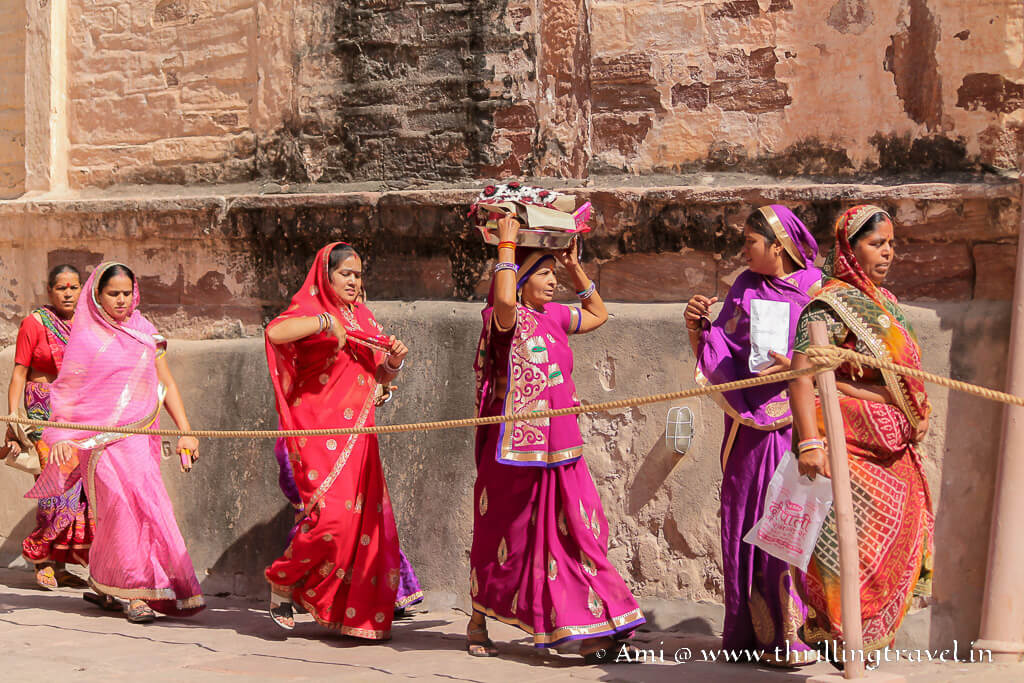
I am given to understand that the idol in this temple is the original one that was carried by Rao Jodha from Mandore to Mehrangarh.
Mehrangarh Museum Shop

After you finish the palaces, you will find yourself exiting the Zenana courtyard or the Zenana Deodi. The courtyard is filled with lovely sandstone windows and jhalis. Past this, you will encounter the Mehrangarh Museum shop. It is here that you can shop for some museum artifacts – which aren’t too expensive but neither too cheap. From Bangles to bags and handicraft items, you can pick something for yourself or your home.
Any purchase made in the Mehrangarh Museum shop is used for the preservation of not just this place but also, the fort in Nagaur forts. You can also, purchase these souvenirs online.
With that, I conclude this section on the key things to see in Mehrangarh fort. It is now time for some practical tips and answers to some FAQs about Mehrangarh Fort.
FAQs about Mehrangarh Fort in Jodhpur, Rajasthan
What is the best way to reach Mehrangarh Fort?
Mehrangarh fort is located in Jodhpur which is one of the key cities of Rajasthan. You can get to Jodhpur by any of the following ways.
Jodhpur by air
Jodhpur has its own airport. However, it has a limited number of flights. Jaipur is the closest international airport with a very good frequency of flights. It is around 5.5 hours by road from Jaipur airport to Jodhpur.
By rail
Jodhpur is a major railway junction and is well connected by trains to the major cities of India. You will find numerous trains on a daily basis to this city
By road
You can hire a cab or car from any city in Rajasthan and get to Jodhpur by road. The road conditions in most parts is quite good. You will also, get a lot of tourist and private buses to Jodhpur from Jaipur and other cities.
Once in Jodhpur, you can hire any of the local transports – autos or cabs to get to the fort. There are tourist buses too that take you to Mehrangarh fort.
What is the best time to visit Mehrangarh Fort?
In terms of season, the best time to get to Mehrangarh fort in Jodhpur would be from October to February when the weather is reasonably cool and pleasant. Jodhpur is a part of the Thar desert and you will find summers extremely cruel.
There are two major festivals that take place in Mehrangarh fort and planning a visit during that time will add a more vibrant touch to your trip here. The first is the Jodhpur Rajasthan International Folk festival that takes place in October. During this festival you can witness some of the best folk performances of India .
The 2nd festival of Mehrangarh Fort is called Sacred Spirit Festival. This usually is celebrated in February. You can enjoy the soulful Sufi beats along with some of the best artists from across the world. For the exact dates of these festivals, you can check the dedicated webpages through the given links in this section.
What are the Mehrangarh fort timings?
Mehrangarh fort and museum is open from 9 am to 5 pm every day.
How much do the Mehrangarh Fort tickets cost?
For domestic visitors, the Mehrangarh entrance fees is INR 200, while international travelers will have to pay INR 600 for the same. If you wish to take an elevator to the highest point of the fort, you will have to pay an additional fee of INR 50. Do note that the elevator is only a one-way charge. You will need to climb down using stairs.
On 12th May, Mehrangarh fort celebrates the Jodhpur Foundation day. On this day, the entry to the fort is free.
What are the Mehrangarh Fort guide charges?
There are two types of guides available at Mehrangarh Fort – in person guides as well as audio guides. The audio guide is available for INR 180 for domestic travelers. For international travelers, it is a part of their entrance fees and they do not have to pay an additional amount for it. The guided tours are available in 11 different languages.
The charges for an in -person guide at Mehrangarh fort vary on the group strength. It is INR 500 for a group of 4 people and goes on to INR 1000 for a large group of 50 people. You can pay these charges at the ticket counter itself.
How much time does it take to visit Mehrangarh Fort?
I would highly recommend keeping at least 4 -5 hours aside to see Mehrangarh Fort. It would be ideal if you can keep aside another hour and visit the royal cenotaphs of Jaswant Thada that is close to the fort. The white and red monument is called the Taj Mahal of Marwar and is totally worth the stop.
Who is the current owner of Mehrangarh fort?
Maharaja Gaj Singhji is the current owner of Mehrangarh Fort. He has established a trust to preserve the heritage of this fort and the royal family.
Do you have to walk up the Mehrangarh fort or you can drive up?
You can drive up the hill to the Mehrangarh Fort entrance. There is ample parking available for your vehicle. From there, you will need to walk past the gates to the inner entrance of the fort.
It is also, possible to trek up the hill to the Mehrangarh fort.
How did Mehrangarh fort get its name?
The Rathore clan consider themselves as Suryavanshis – worshippers of Sun God. They decided to name their new abode in honor of their Lord. Initially it called called Mihirgarh – Mihir meaning Sun and Garh meaning fort. However, with the local dialect and accent, the name changed to Mehrangarh.
What is the famous quote of Rudyard Kipling on Mehrangarh Fort?
Rudyard Kipling, the famous English novelist described Mehrangarh Fort as “A palace that might have been built by Titans and colored by the morning sun”
Travel and Photography tips
- There are two cafes located inside Mehrangarh fort – Cafe Mehran and Palki Cafe. You can opt for light meals and snacks at these places. Both of them are reasonably priced.
- There are clean toilets and drinking water stations available inside the fort.
- There is a fair amount of walking to be done. Comfortable shoes and clothes will make it easier and more enjoyable to tour the fort.
- Carry a wide-angled lens as well as a zoom lens for capturing the architectural details of the place.
- Tripods are not allowed inside the fort
- If you are opting for the Zipline activity, remember to carry your action camera with you.
Before you go, pin this
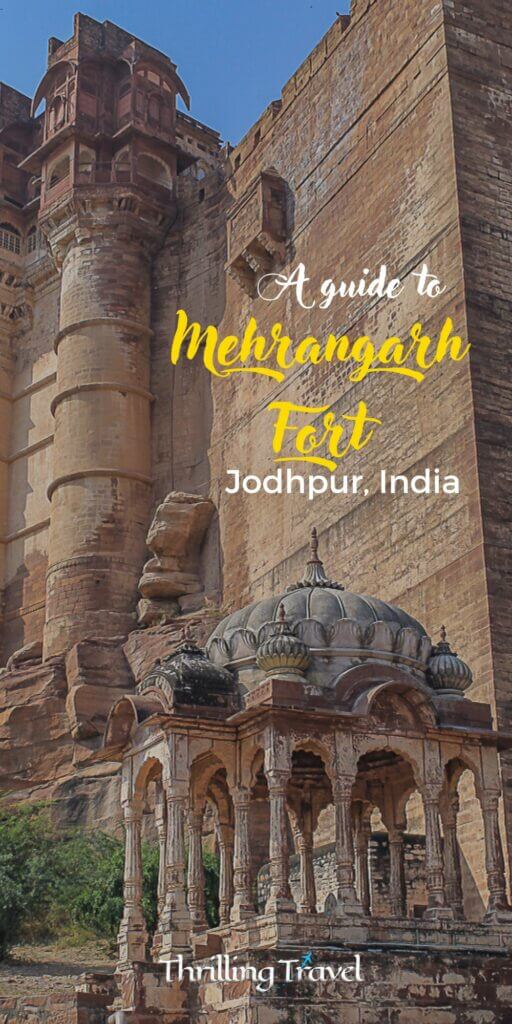


Disclaimer: This article includes affiliate links. This means that at no cost to you, I will receive a small commission if you purchase through my link. Thank you for supporting me with this.

Popularly referred to as a Restless Ball of Energy. My Mom refuses to entertain my complaints about my equally restless daughter & assures my husband that I was born with a travel bug.
I am a Post-Graduate in Marketing by qualification and a travel blogger by passion. Besides travel, I enjoy photography and if you don’t find me at my desk, I would be out playing badminton or swimming or just running. I believe in planning for every long weekend through the year. And when I cannot travel physically, I travel virtually through this travel blog. My travel stories have also, got published on various websites and magazines including BBC Travel, Lonely Planet India and Jetwings. I have recently published my first book – When Places Come Alive – a collection of stories that are based on legends, landscapes, art and culture of a place which is available in both ebook and paperback format.
You might also like these posts –

Never been to Jodhpur, but have heard a lot about Mehrangarh fort, especially after the 2008 Batman movie. And I must say that as compare to other forts in Rajasthan or north India, this one is quite clean. I think the Jodhpur royal family should turn it into a resort, as this will be one hell of a holiday destination. Good share Ami.
Thanks Jatin. Mehrangarh is my favorite for lots of reasons.
This is a beautiful fort… and lovely pics…
Thank you.
Like most forts in Rajasthan this one too is grand. Looks very well maintained.
It does and is one of the best maintained ones. Totally loved the place.
Mehrangarh is undeniably our pride. Have never seen such an illustrative post as yours. Thanks and I hope you enjoyed our hospitality.
Waiting eagerly for the next post in the series.
Cheers,
Radhika!
P.S. Do check out my latest post, being a travel story, might interest you. 🙂 https://www.expressinglife.in/2016/07/the-story-of-our-not-so-ideal-family.html
Thanks Radhika. The next post coming up soon. Cheers
Detailed and nice tour of the fort though your post. And so much images makes it more relate-able.. Thanks for another beautiful journey..
Thank you and glad you liked it.
i am a regular reader of your blog and from past few months i have not missed a single post by you but i must say the pics you have shared here are the best pics i have ever seen in your blog, earlier pics are awesome but these pic has totally blown my mind, super awesome takes.
Thank you Jyotirmoy. Mehrangarh is so beautiful that naturally, the pics too, are 🙂
I loved it too, wish I had more time though. Waiting for your part two now.
I know what you mean Mridula. Time is just not enough here. Part two coming up soon
Comprehensive coverage of Mehrangarh fort. Nice read.
Thank you Niranjan
What a perfectly detailed account of an incredible site! I feel like this is a several day activity with lot’s of time to sit and paint small watercolors of everything. Really incredible!
Thanks Rob. It sure is an amazing place and yes, for you, tons of watercolor inspiration.
Ami, Everytime I read one of your posts I want to book a ticket. I loved traveling in the area around Jodphur, but did not get to go to the fort! Next time.
Thank you Jim. I hope you get to go to Mehrangarh the next time. It is a definite recommendation from my end.
This fort is so big! I imagine you could spend a few days exploring all of it! Amazing carvings and paintings which is not what I think of when I think fort!
True. One does not really think of carvings when it comes to a fort. But this one, with its palaces inside is just amazing.
Will try to visit this weekend
Awesome. Have a good trip
Nice elaborate post, Ami. I have been here and the fort looks beautiful when lit up at night.
Thanks Roohi. I could only see the evening lights from afar and even that was beautiful.
Nice post! Rekindled my memories of Mehrangarh Fort… a wonderful place to be.
Thank you. Glad you liked it
Beautiful pics 🙂 hope I will get chance to visit this Fort
Thanks Vishal. I hope you get there soon
What brilliant architecture. Your posts are always so gorgeous and full of history and beauty. My fave is the one of the musicians. 🙂
Thank Melody. Glad you are enjoying my India posts. Hope you get here soon
Looks like nothing has changed! The same charm in the pics like i had seen years ago! (The comment box didn’t open up.)
Thanks Indrani. It is a charming place. I think it gets better with time.
P.S: Not sure abt the comment box. Do try again and see.
Mind blowing captures !! But those hand prints are something else……….they just sent shivers down my spine ………..
Yes, those hand prints are sad 🙁 Like I said, a dark secret of the fort.
I am from Jodhpur and every friend/relative/collegue who visits Jodhpur demands to see the fort. It is an absolute beauty and the view of the blue city from the top of the fort looks amazing. Many bollywood movies are shot from this fort. You have captured the essence very well.
It is the pride of your city and for me Jodhpur is all about this fort. Thanks for stopping by
Amazing pictures.. i would luv to visit the same 🙂
Thank you Maitreni. I hope you visit soon
Well researched and documented post..along with amazing snaps…Double Thumps Up : )
Thank you Indranil
Great post Ami! Thank you for refreshing my memories and can’t agree with you more – the fort is one of the most mesmerizing monuments that I have visited in India! Look forward to reading part 2 & 3.
Thank you Chaitali. Stay tuned, other parts coming up soon.
The fort looks beautiful and thanks for sharing interesting facts and information. This post is no lesser than a travel guide!
Thank you Anamika. Visit back for part two.
Amzing pictures. Thanks for sharing this one. I try imagining myself visiting the fort. It is something I would do in an early morning before the place becomes crowded. Hehe. This is one of my top list if revisiting India. Have seen a documentary. It seems impressive and I hopefully I will be able to see it with my own eyes.
Thank you Lance. Glad you liked Mehrangarh as much as I did. It sure is an amazing fort.
The first glimpse is quite breathtaking! It’s a grand fort with majestic architecture…
Thanks Maniparna.
Amazing pictures and site, and you did a great job with your telling of the place’s various history. Thanks for sharing.
Thank you. Glad you liked it
I’ve never heard about this fortress before, it’s amazing! I am not sure if I will go to India soon, but this would definetely be on my bucket list. And also congratulations on the photos, they are all great!
Thank you and yes, Mehrangarh Fort is one of our best forts. A visit here is a must 😀
Wow! that is a massive fort. It looks way bigger than the Red Fort in Delhi which is the only one I’ve seen in India.
Thanks Shobha. It is a lot different than Red Fort. Not sure of bigger though.
A hauntingly beautiful post..it has introduced me to various unknown facts about Jodhpur.
Thanks. Glad you enjoyed it.
This Fort reminds me of the scene at Lord of the Rings where the Elves are waiting for Frodo. I wonder how the early folks do these beautiful fort and make it last for centuries. You are indeed blessed to see this part of miracle 😀
Thank you Blair. Indeed blessed. And with that, I have to watch the Lord of the Rings again 🙂
I love how you give a bit of history and meaning in your story 🙂 Makes me feel so much more educated than just looking pictures and names. It’s an incredible place, and putting it on my bucket list 😀
Thank you. Glad you are enjoying it.
Was going to say been there done that but NO I was in Jaipur, but kind of have very similar attractions! I miss India so much!
Jaipur is amazing but Jodhpur is a lot different. You got to come back and check it out. 🙂
This place is amazing and the architecture so beautiful. I love learning about new places and the history behind it that you gave is fantastic. Very detailed information which also serves as a guide to. Beautiful place to visit.
Thank you Sheri. It is a lovely place to visit.
It looks so incredible! I was wondering, if there were any movies filmed in here? I think they should have made at least one movie, that’s for sure.
One of the Batman movies was filmed here :D. Thanks for stopping by
Wow, amazing … very nice your picture, you are displaying a very beautiful thing here. so wanted to visit that place.
Thank you. I hope you get here soon. 🙂
The Mehrangarh fort is another majestic example of the fascinating architecture of Rajasthan that is steeped in a colourful history combined with a vibrant culture. Jodhpur is high on our list and hope to get there soon.
Hope you get there soon Vyjay
We have been to Mehrangarh fort on your visit to Rajasthan and it is one grandiose fort with aweinspiring architecture.
🙂 I feel the same way too. Thanks for stopping by
That fort seems like such an exciting place to explore! I loved the beautiful paintings and colors. I saw a hook and pulley system like that in Hamburg and I was told it was for getting goods on and off ships. Not sure if that makes sense here!
Thank you. I think the system here was to get stuff from the foothills into the fort. Similar use. 😀
Aaah The Land of Forts. i last visited Rajasthan in 2014. I have only seen the Eastern side of it. But would love to go back one day and cover the Western part of this State. Arnt those forts amazing with such beautiful architecture. In fact, it sometimes thrills me the level of knowledge and the advancement in architcture in those days that their buildings are still standing while ours are falling once in every 2-5 years 😛
I agree Subhadrika. The stuff that they made back then were just amazing. I am always in awe of it. 🙂
Wow, this is so impressive, the details and the photos are just amazing! I bet it’s impressive when you’re getting so close, because I do feel that way just looking at them quite frankly!
It was just amazing getting up and close to it. You got to try it. Book your tickets and get here 😀
Wow! I have not seen this while I was in India and it’s a shame because it’s looks amazing.
Thank you for the historical background, it was very interesting.
Thank you Jane. Hope I have inspired you to make a trip back soon 🙂
How come I had never heard from this fort before, it is simply stunning. Definitely on my must visit places if I ever visit India.
This is a popular destination alright. However, when up against a Taj, you miss out on it. Definitely worth a visit.
I am from Jodhpur only and glad to read your beautiful article. The way you describe our very own for is just wonderful. You almost covered all the stories and places in the fort. Thank you for your kind words for Mehrangarh fort.
Best regards
ABHAY VYAS
Glad you liked it Abhay. This is my favorite fort. 🙂
I went to the fort on 2010. But somehow, I don’t recall a thing. I guess it’s also because I didn’t take pictures then. Your post is making me long for a trip done with awareness. It looks even more majestic now.
Time to revisit it again. Hope you get to it soon and see it in entirety.
The forts looks amazing and it’s strategically located on a hilltop dominating the city skyline. I’ve been to Agra Fort, but this Fort looks so grand in design and history. The walls, the design and interiors are very well preserved.
Brings back memories of India.
Agra fort is so different from this place. This one is a lot more maintained and very majestic from inside. Hope you can get to visit this one too.
I am speechless Ami! This fort is truly magnificent and the architecture is out of this world. The seven gates are fascinating and so cool they each have their own history. The paintings are amazing to see too and in great condition. I’d definitely like to visit Rajasthan to see this fort for my self one day!
I really really hope you can make it here. It is my favorite fort and you will definitely love it.
I would have loved to visit Mehrangarh Fort when I was in Jodhpur but we didn’t have enough time. I was witha group and the common decision was to do the zip line and see the fort from the outside rather than see the interior as well. We did get a glimpse of one of the doors, the one we passed through to get to the zip line desk. The interior of Mehrangarh Fort looks so beautiful, with so many different rooms and so many details still in there. A proper work of art! The views over the blue city are also breathtaking. I was lucky to see those from the top of one of the towers.
Yikes. I wish you had done the interiors too. But a reason for you to come back. The blue city is just amazing and no matter how many times you get to this fort, you will love it
This is totally the most comprehensive article on Mehrangarh fort, I have ever read . Kudos! We stayed at a place from where we could see the fort from our windows. It is really incredible the way it has been maintained, considering it is 600 years or so old. The luxurious rooms tells us how the Maharajas of yesteryears lived.
Me too, my hotel was right across the fort and it looked amazing at Sunrise. Thanks for the compliment on the post. 🙂
It was interesting to read that one visit to the Mehrangarh Fort in Jodhpur might not be enough. The architecture and history would captivate me for sure. Fascinating that there is no real demarcation between the different architectural styles. I am always amazed at how much colour still remains in the designs. I would certainly check out the palanquins and howdahs used by the royalty in the museum.
I have bookmarked this post to help guide us if we ever visit. One time or more!
You are so right, Linda. This place needs to be visited more than once. I am still not satisfied with my visits.
Every history enthusiast who visits India will not be let down. And I do concur that the Mehrangarh Fort in Jodhpur is among the most beautiful forts in all of India. I adore the old-fashioned yet tastefully elegant facade. I would also adore going inside and spending some time admiring the stunning interiors. If I make it there, I’ll undoubtedly take a ton of pictures of every inch of this magnificent fort.
I am sure this fort will leave you longing for more.
Mehrangarh Fort is huge and I thought you will need more than a day to visit the complex. But you said 4-5 hours is sufficient. I like that most part of the fort is built with earthen colors, although I also like the colorful parts. Not like you, I kind of like Phool Mahal. I like the combination of royal colors, blue and gold. But maybe it will be different when seeing it in person.
Phool Mahal is colorful alright and it actually glitters. Moti Mahal was more my style. Colorful yet subtle.
Wow Mehrangarh Fort looks huge but good to know you can see most of it in one day or 4/5 hours! I love places like this, so much history and heritage and a real architectural feat. My kids and I love ticking off castles and forts and learning about local history so this one is definitely going on the list and also great to now that an audio guide is included in the visit for international travellers. Such an informative post especially with the extra tips such as knowing there is 2 cafes on sight and clean drinking water. Bookmarking this post
Laura x
Thank you so much Laura. If you like history and castles, then this is one place that will more than satisfy you. Hope you get to it soon